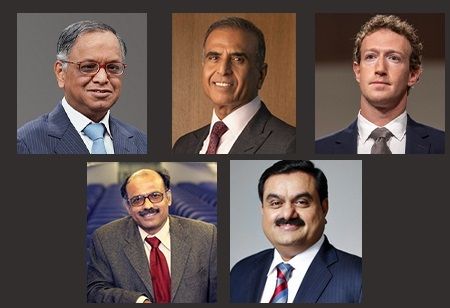
5 Entrepreneurs Who Turned Failures into Success


Turning a small idea into a big success is not everyone's cup of tea. If business growth strategies go wrong, downfall often knocks people to the ground and pours water on the spark. The Japanese proverb “Nana korobi ya oki,” which translates into 'Fall down seven times, get up eight,' aesthetically elucidates how great entrepreneurs have achieved success despite the sting of failure on their first try. If it weren't for entrepreneurial resilience, we would not have had electricity or even Disney cartoons to watch on TV using it. Lessons learned from the inspiring entrepreneurial journey of leaders who turned failure into success will help budding leaders take steps to achieve success. Here are some of the inspirational stories of entrepreneurs overcoming failure.
NR Narayana Murthy
Hailing from a humble background in Mysore, India, Narayana Murthy's journey is an inspiring testament to the power of determination and vision. Throughout his entrepreneurial career, Narayana Murthy embodied the values and principles that set him apart. From his emphasis on integrity and transparency to his unwavering commitment to excellence, he established a blueprint for success that young entrepreneurs can learn from. His leadership style revolutionized the Indian IT industry, propelling Infosys to become one of the world's largest IT companies. His ability to inspire and empower others played a crucial role in this transformation.
Narayana, now synonymous with India's IT revolution, was not always a famous name. The founder of Infosys started his career as a chief systems programmer at IIM Ahmedabad. He left that position and started a company called Softronics. This company went bankrupt within a year. He joined Patni Computer Systems in Pune. Later, with a capital of Rs 10000, he started Infosys. And the rest is history.
Sunil Bharti Mittal
After graduating from Punjab University, Sunil Bharti Mittal, the founder and chairman of Bharti Enterprises, did not follow his father's footsteps in politics; instead, he started a bicycle parts manufacturing business in 1976 at the age of 19. He then launched a series of ventures selling wool blankets, stainless steel surgical instruments, and generators. However, during a visit to Taiwan in 1985, he became convinced of the growth potential and entered the telecommunications business. By partnering with international companies, the company expanded its operations and built a mobile network that covered 96 percent of India's population. The company expanded into Africa with a $10 billion acquisition in 2010.
Sunil started a crankshaft business for a local bicycle manufacturer at a young age. Soon, he started two more factories. However, the profits were not as good as expected. Hence, he sold the business and moved to Mumbai. Sunil then started Bharti Overseas Trading Company in 1980. The company imported generators from Japan and did quite well. However, in 1983, the company was shut down due to licensing problems; he was not given a license to import materials. Sunil went out of business overnight.
Undaunted by the difficulties, he set up a telecommunications service company that was licensed by the government. Eventually, Airtel became a telecommunications brand for residential customers.
Mark Zuckerberg
Mark Zuckerberg, co-founder and CEO of Facebook, is an icon of modern entrepreneurship, innovation, and controversy. His journey from a college dorm room to becoming one of the tech industry's wealthiest and most influential figures is a story of remarkable success and tumultuous challenges.
While at Harvard, Mark Zuckerberg created Facemash, HarvardConnection.com, and an art history website (for his college friends). All three websites failed. They either failed due to privacy issues, or they failed. Zuckerberg then modified and combined these three ideas to create Facebook. Since then, Facebook has only grown. Mark Zuckerberg faced difficult times with a determination to win, and he did.
Captain Gorur R Iyengar Gopinath
Captain Gorur R Iyengar Gopinath is well known for his daring ploy to offer airline tickets for one rupee. The founder of Air Deccan said that when he was trying to start a low-cost airline in the United States, he found a carpenter as a passenger. He had to overcome several hurdles in pursuing his dream, including dealing with competitors who tried everything to keep him from succeeding, and corrupt bureaucrats and politicians. In the end, Air Deccan took to the skies in 2003, and Gopinath had to wait three years to get his license.
Captain Gopinath's father was a school teacher, the second of eight children. After finishing school, Gopinath served an eight-year appointment in the Indian Army. After leaving the army, he became a farmer, established a sustainable farm, opened an Enfield dealership, and ran a hotel. After many ventures, failures, and adversity, Captain Gopinath finally launched Deccan Aviation, a helicopter charter service.
Gautam Adani
Gautam Adani is the founder and chairman of the Adani Group, whose industrial interests include coal trading, coal mining, oil and gas exploration, ports, combined logistics, power generation and transmission, and gas distribution. Gautam Adani's path to building his empire was not easy, as he faced tremendous adversity early in life: at the age of 18, Gautam Adani dropped out of Gujarat University and, while still in his second year of a bachelor's program, had to start working as a diamond sorter in Mumbai due to financial crisis. But the young Goutam was undeterred by early adversity and quickly established a diamond trading business that earned him his first million dollars by the age of 20. In the short time that followed, Goutam built an $8 billion professional management empire in one of India's best-known business houses.